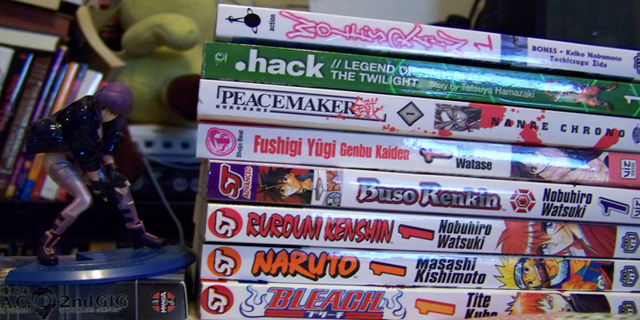Ever The Restless Puppy Hero.

Final Fantasy VII is one of those rare games that have the ability to generate heated discussion among many gamers more than ten years after its original release. For many, FFVII brings back fond memories of playing Final Fantasy for the first time ever in full 3D. For others it was the start of a trend that would change the very nature of RPG story telling forever and not necessarily in a good way. Regardless of spirited debates, to put it lightly, between fans and non-fans of the game alike, FFVII remains a cash cow for Square Enix. It was no surprise to anyone when multiple spin-offs revolving around FFVII were announced a few years ago. Final Fantasy: Advent Children‘s release in 2005 marked the start of the myriad of Final Fantasy VII related releases that would become known as the “Compilation of Final Fantasy VII.”
With that said, Crisis Core: Final Fantasy VII is the most recent title to be added to the Compilation, and many agree that it might be one of the best video game releases so far. Crisis Core succeeds in a variety of areas, where other games failed (most notably Dirge of Cerberus) because the game sticks closely to its FFVII roots and even expands them. Turning on the game means taking a trip back through time and visiting the world of Gaia all over again, with updated graphics (the best around on the PSP so far) and filled-in plot holes no less. In short, Crisis Core uses nostalgia to its advantage in everything from characters, to music and even locations. The entire premise of the game is simple enough by playing as Zack, also known as the deceased 1st Class SOLIDER who Cloud thought he was for the majority of Final Fantasy VII. It is a highly approachable but powerful premise because Zack’s fully fleshed out character is both intriguing and very easy to like. Knowing that he faces an untimely assassination at the end of this story creates a foreboding undertone that runs throughout the game.
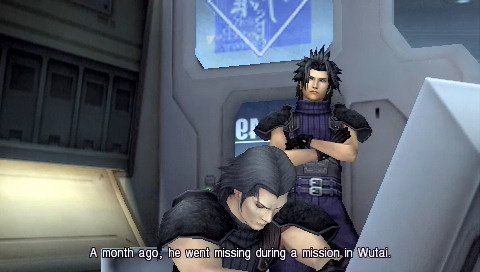
The story of the game itself is excellent as we see Zack develop into a stalwart but always kind, 1st Class SOLIDER operative. At the start of the game it is already clear that Zack is a very different man from Cloud. While they are both badass swordsmen, our dark-haired protagonist is very upbeat in contrast to the brooding blond that ultimately succeeds him. Zack starts off as a 2nd Class SOLIDER who assists his superior, mentor, and friend, 1st Class SOLIDER Angeal in ending the war between Shinra and the Wutai nation. Before the war is over, Angeal’s friend and fellow 1st Class Elite SOLIDER, Genesis deserts the military and turns on Shinra. Zack, Angeal and Sephiroth (remember this guy?) are charged with eliminating Genesis but eventually turn on Shinra themselves, but for different reasons (though it is Shinra that turns on Zack). It is from this point on that we see Zack rise to the top and fall very hard as everything he believes in unravels, especially after the disaster in Nibelheim. On a final storyline note, Cloud and Aerith (Aeris) are the two Final Fantasy VII regulars who play an important role in supporting Zack for a good portion of the story. In turn their interactions with Zack set the stage for how these characters are presented in VII. While Sephiroth plays a big role in the story, it is left to Cloud and not Zack to resolve the entire conflict.
The game play of Crisis Core isn’t quite as good as the story, unfortunately. At its core the game is still an RPG, but unlike its console predecessor (story-wise) the RPG and game elements have been modified for a handheld system. Instead of experience points and the standard Final Fantasy menu, everything has been replaced with the DMW or Digital Mind Wave. Based on Zack’s interactions with and memories of characters within the story, levels are gained, stats are boosted, and even summons can be called forth. If three of the same numbers line up then depending on the number either Zack or his materia will level up. If three of the same characters appear, depending on who or what they are, several different things will happen but Zack usually receives a “Power Surge!” or temporary boost in stats in addition to a special attack, such as Sephiroth’s Octoslash or military air support from the Turks.
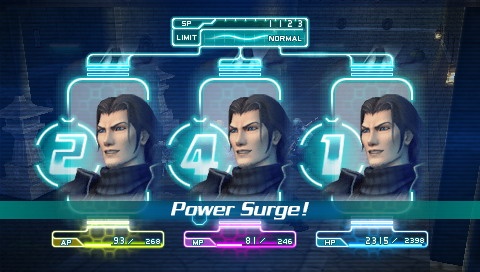
The DMW is actually an elaborate way of saying that the leveling and summoning systems in the game have been randomized to a degree. Instead of grinding to gain levels for both Zack and his materia, stat growth is based on a hidden experience points system that the player never sees. The only points that are visibly gained from fights are SP, or solider points which aids in materia fusion, among other things. This creates a system that can feel incredibly unbalanced at times, especially to RPG lovers who are used to growth based on experience that can be easily measured. For example, in order to gain a level the DMW wheel must spin and hit a 777 (after reaching the required exp on the invisible counter), fighting really hard enemies is no guarantee that the magical triple seven will be reached any faster than with easier enemies. The same goes with materia growth, although it doesn’t give birth to new materia in this game. With such seemingly random stat gains Crisis Core remains a surprisingly easy game, if one only takes the storyline mode into account. The majority of enemies can be defeated by pressing the attack button, or X, despite the entire action game premise.
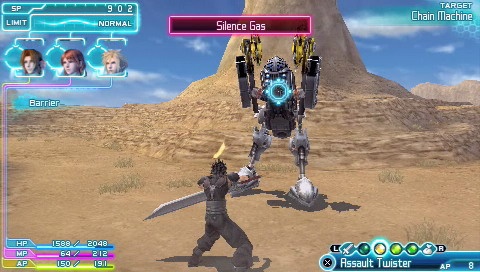
The “X” button activates every attack in this game. Better than Menu-> Fight -> Command, I guess.
Though the fighting system seems simplistic, (press X to slash, square to roll and triangle to defend), it can be made more complex. Through the use of materia, Zack can be given additional commands such as “jump”, “punch” or even “dash” which replaces the useless “defend” command. The complex game play is wasted on the storyline fights but it really shines when doing the missions. The missions themselves are not directly related to the story but are actually a series of side quests. The missions encompass story elements such as cleaning up after the war with Wutai, fighting monsters created in Hojo’s lab or hunting for rare materia. There are three hundred in total and they are grouped off into different categories. Missions become available throughout the game by either doing more missions or going through the story. The missions vary in the length of time that it takes to complete, some can be done in about five minutes and others can take two or more hours to complete. Depending on Zack’s level the missions are ranked as Very Easy up to Very Hard, though a careless player can find themselves dead at just about any mission level. The missions are completely optional but usually net rare items, access to secret shops, summons and yes, extremely challenging (or ridiculously hard) game play at times.
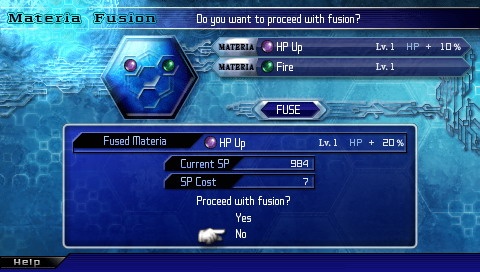
Such a simple name hides a very complex system.
The materia system has been overhauled for Crisis Core with new elements introduced such as materia fusion. The game’s story mode can be completed without ever having to fuse a single bit of materia. Fusion simply allows for the combining of different types of materia (and later items) to create new materia. Some of which can actually be brought later on in the game or found by doing missions. If a player wants to finish all three hundred missions then materia fusion becomes a must at some point. Fusing materia isn’t always done to create new types of materia, but is most useful when tweaking boosting the stats of existing materia, which in turn greatly improves Zack’s stats. Elements such as MP, HP, AP (ability points that let Zack execute special commands like “roll” and “dash”), luck, etc, can be enhanced and boosted through fusing materia. So instead of equipping HP++ and wasting a materia slot which could be used for something else, a magic materia like Firaga could be fused over and over again with items until it yields an HP boost of %150 when equipped. Because Zack is the only playable character and he only gets six materia slots total, space can be at a premium at times and adding stat boosting properties to materia can greatly help out when selecting items to take into battle.
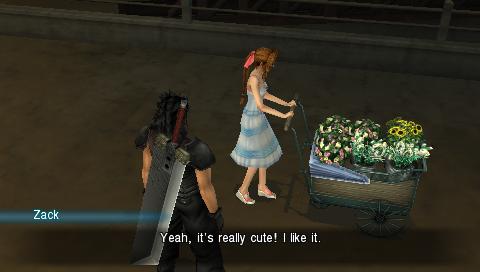
All in all, Crisis Core is a solid game. It is a must play for fans of FFVII looking for a great tie-in and expansion. Can the game stand alone? No, but it really doesn’t seem to matter. It serves its purpose well as a prequel that seamlessly leads right into the events of the original. Technically the game could be played before starting other games (or watching movies) in the Compilation but the title itself is part of a larger gestalt. In other words, despite how well done Crisis Core is, Final Fantasy VII’s whole is still greater than all of its parts, including this game. Square Enix’s little cash cow will likely live on to see another day and another part added to that growing compilation.
All of the images used in this article come from the Final Fantasy VII Citadel, a great Final Fantasy VII resource.

